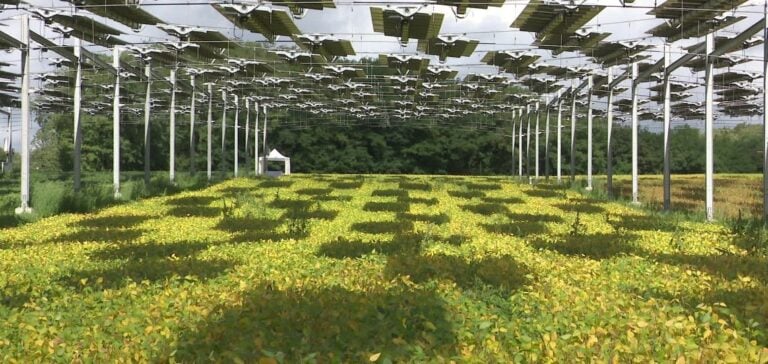During a protest held in Tulle, Corrèze, 80 to 100 members of agricultural unions, including the Confédération Paysanne, gathered to oppose agrivoltaics projects supported by the local agricultural chamber. The event took an unexpected turn after controversial remarks from a local official, triggering a heated debate and a formal complaint.
The protest aimed to denounce projects led by the Rural Land Company of Corrèze, supported by the majority union FDSEA (Fédération Départementale des Syndicats d’Exploitants Agricoles). Protesters, symbolically installing photovoltaic panels in a parking lot, criticized what they described as “purely speculative operations” leading to “land grabbing.” According to them, these initiatives endanger agricultural yields by transforming fertile lands into energy production zones.
An Accusation That Struck a Nerve
During a session of the agricultural chamber, members of the Confédération Paysanne were allowed to speak, but tensions escalated upon their exit. Pierre Beysserie, vice-president of the agricultural chamber and a member of FDSEA, accused them of employing “Nazi methods.” He later attempted to justify his remarks, stating: “I didn’t say you were Nazis, but that your methods are.”
These statements were immediately deemed “unacceptable” by Jean-François Ensergueix, a Modef (Mouvement de Défense des Exploitants Familiaux) official, who, along with several Confédération Paysanne representatives, filed a complaint at the Tulle police station.
The Stakes of Agrivoltaics
Agrivoltaics, which combines agricultural and energy production, is promoted by its advocates as an innovative solution to address energy transition challenges. However, it has sparked divisions, particularly in Corrèze, where criticism focuses on its impact on land use and profitability for farmers.
The Confédération Paysanne argues that photovoltaic panels should be installed on existing infrastructure, such as barns or parking lots, rather than on arable land. Conversely, the FDSEA defends these projects, claiming they enable controlled and locally beneficial development.
A National Debate Highlighted by Local Tensions
This conflict reflects a broader tension between energy transition goals and the protection of agricultural lands. Agricultural stakeholders often decry a lack of consultation and economic mechanisms favoring land speculation at farmers’ expense.
In this context, Pierre Beysserie’s remarks have exacerbated divisions. While the official acknowledged the “harsh” nature of his comments, opponents of agrivoltaics see it as an attempt to discredit their mobilization.
Meanwhile, the Corrèze agricultural chamber continues to support the Rural Land Company, describing it as a tool to ensure collective economic benefits from photovoltaic development.






















